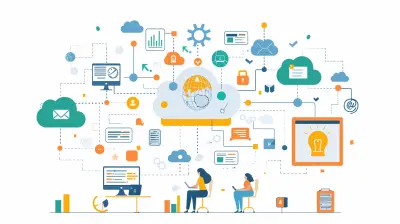19 March 2025
The world of tech startups has always been associated with innovation and disruption. But what if I told you that an increasing number of these startups are shifting their focus beyond just making a profit? Yep, you read that right. Many are also aiming to create a positive social impact, tackling some of the most pressing challenges we face today. From addressing climate change to improving healthcare and education, the intersection of technology and social good is becoming a major trend. It’s not just about the next big app or gadget anymore; it’s about creating technology that makes the world a better place.
So, why is this happening now, and how are tech startups leading the charge for social change? Let’s dive into the exciting world where tech innovation meets social impact.
The Rise of Socially Conscious Startups
Why Now?
You might be asking yourself, "Why are so many tech startups suddenly concerned about social issues?" Well, it’s not exactly sudden. Over the past decade, we’ve seen a growing awareness of global challenges—whether it’s climate change, inequality, or access to education. Plus, consumers are becoming more socially conscious. They’re not just looking for the coolest new gadget; they also want to know that their purchases are making a difference.Millennials and Gen Z, in particular, aren’t shy about their expectations. These generations care deeply about social and environmental issues, and they’re holding companies accountable. In fact, studies show that a majority of consumers are willing to switch to a brand that supports a cause they care about. It’s no wonder tech startups are paying attention.
Tech’s Unique Ability to Drive Change
Here’s the thing: Technology has the power to solve problems on a massive scale. A single app can reach millions of users. A piece of hardware can revolutionize how we interact with the world. And the best part? Startups are agile, innovative, and often willing to take risks that larger corporations shy away from.In many ways, they’re perfectly positioned to tackle global challenges. Whether it’s through data-driven solutions, AI-powered innovations, or platforms that connect people, tech startups have an incredible ability to create lasting social impact.
Areas Where Tech Startups Are Making a Difference
1. Climate Change and Sustainability
Let’s start with one of the biggest challenges we face: climate change. As the planet heats up, the need for sustainable solutions has never been greater, and tech startups are stepping up in a big way. From clean energy innovations to smart agriculture, tech entrepreneurs are finding ways to reduce our carbon footprint.Take, for example, Tesla (yes, still considered a startup in its early days), which revolutionized the electric vehicle market. Their mission wasn’t just to make cool cars; it was to accelerate the world’s transition to sustainable energy. Now, we’re seeing countless startups in the renewable energy space, developing everything from solar panels to wind turbines that are more efficient and cost-effective.
Another great example is Impossible Foods. They’re tackling the environmental impact of meat consumption by creating plant-based alternatives that taste just like the real thing. Not only are they reducing greenhouse gas emissions, but they’re also addressing issues like water and land use.
2. Healthcare and Accessibility
The healthcare industry is notorious for being slow to change, but tech startups are disrupting the space with innovations that improve access to care, lower costs, and enhance the patient experience.Telemedicine platforms like Doctor on Demand or Amwell are making it easier for people, especially in remote or underserved areas, to access medical care without needing to visit a hospital or clinic. This is especially important in a world still reeling from the effects of the COVID-19 pandemic, where healthcare systems are strained, and in-person visits can pose risks.
And then there’s wearable technology like the Fitbit or Apple Watch, which are doing more than just counting steps. These devices are capable of monitoring heart rates, detecting irregularities, and even notifying users if something’s wrong. In the near future, we could see wearables that predict health issues before they even happen.
On the accessibility front, startups like Be My Eyes are using technology to help the visually impaired by connecting them with sighted volunteers via video calls. These volunteers can assist with everyday tasks like reading a sign or picking out an outfit, making the world more navigable for those with disabilities.
3. Education and Digital Learning
Education has long been a sector in need of innovation, and tech startups are bringing much-needed change to the table. With the rise of online learning platforms and ed-tech tools, education is becoming more accessible and scalable than ever.Take Khan Academy, for instance. This nonprofit startup has democratized education by offering free learning resources to anyone with an internet connection. Whether you’re a high school student struggling with math or an adult looking to learn a new skill, Khan Academy has something for you.
Another notable player is Duolingo, which gamifies language learning and makes it fun and addictive (in a good way!). The app has made learning new languages accessible to people all over the world, many of whom might not have the financial means to pay for traditional classes.
In regions where access to education is limited, startups like Bridge International Academies are using technology to bring affordable, high-quality education to underserved communities. By leveraging data and tech solutions, they’re able to deliver personalized learning experiences that aren’t dependent on traditional infrastructure.
4. Social Justice and Equality
Tech startups are also playing a role in promoting social justice and equality. Whether it’s through platforms that amplify marginalized voices or technologies that help bridge the digital divide, these companies are working to create a more equitable world.Patreon, for example, provides a platform for creators—many from underrepresented communities—to monetize their work without relying on traditional media outlets. This allows independent artists, writers, and activists to build their own audiences and make a sustainable living while staying true to their values.
Another powerful example is Code2040, a nonprofit that works to create opportunities for Black and Latinx people in tech by offering internships, mentorship, and career support. The tech industry has long struggled with diversity, and initiatives like these are helping to close the gap.
Challenges and Criticisms
Of course, it’s not all rosy. While many tech startups are genuinely committed to creating social impact, others have been criticized for "greenwashing" or "social washing"—essentially using social impact as a marketing tool without truly committing to meaningful change.For example, a startup might claim that they’re eco-friendly because they use recyclable packaging, while ignoring the fact that their manufacturing processes are highly polluting. Or a company might tout their commitment to diversity, but fail to create an inclusive workplace culture.
The challenge for consumers is to discern which companies are truly making a difference and which are simply hopping on the social impact bandwagon for the sake of branding.
Startups also face the challenge of balancing profit with purpose. In the tech world, where venture capital funding is often tied to rapid growth and high returns, it can be difficult for startups to prioritize social impact without sacrificing their bottom line.
The Future of Tech and Social Impact
So, what does the future hold for tech startups with a social mission?As more consumers demand that companies take a stand on social and environmental issues, we can expect to see even more startups focusing on impact-driven innovation. In fact, many investors are now prioritizing ESG (Environmental, Social, and Governance) criteria when deciding which companies to back, meaning that social impact is becoming a key factor in business success.
We’re also likely to see more collaborations between tech startups and nonprofits, governments, and other organizations working toward social change. After all, solving global challenges requires a collective effort, and technology can’t do it alone.
But one thing is clear: The days of startups focusing solely on profits are behind us. The future belongs to companies that can combine innovation with a mission to make the world a better place.
Conclusion
The intersection of tech startups and social impact is one of the most exciting trends in the business world today. By leveraging technology to address some of the world’s most pressing challenges, these companies are proving that you don’t have to choose between doing well and doing good.From fighting climate change to improving healthcare, education, and social justice, tech startups are driving positive change on a global scale. And as consumers, we have the power to support these companies by choosing to invest in products and services that align with our values.
As the saying goes, "With great power comes great responsibility." Tech startups have the power to shape the future, and many are rising to the challenge. The question is: Will they lead us toward a more just, sustainable world? Only time will tell, but the momentum is certainly heading in the right direction.










Runevale Gill
This article wonderfully highlights the critical synergy between tech startups and social impact. It's inspiring to see innovation driving positive change. I look forward to seeing how these initiatives evolve and contribute to a better future.
April 5, 2025 at 4:05 AM